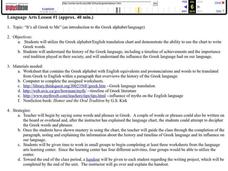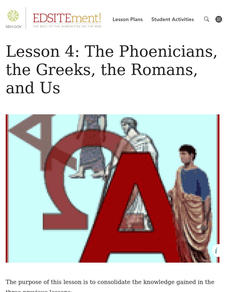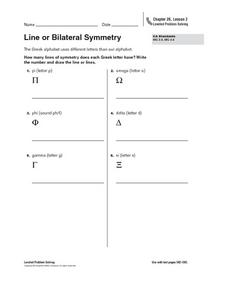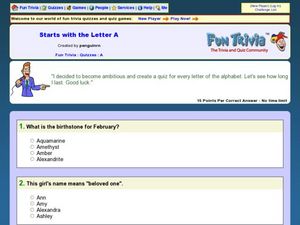National Endowment for the Humanities
The Greek Alphabet: More Familiar Than You Think!
In this Greek alphabet lesson, pupils explore the Phoenician origins to the Greek alphabet. Learners compare Greek letters to current letters and write a paragraph about the life of students in ancient Greece. They also identify...
Curated OER
It's All Greek to Me
Introduce your class to the Greek alphabet and language. Examine how the Greek language influenced the English language. Study the history, timeline of achievements, and the role oral history played in Greece.
Curated OER
The Greek Alphabet
Tenth graders examine the history and origins of the Greek alphabet. They take notes while listening to a teacher-led lecture, and read and interpret common Greek words on the board. Students then create a decorated name plate with...
National Endowment for the Humanities
Lesson 4: The Phoenicians, the Greeks, the Romans, and Us
Learners review knowledge gained in the three-part unit on the history of the alphabet. Using maps and images, learners consolidate their understanding of ancient Greece, the Romans and the Phoenicians, and their respective impacts...
Curated OER
The Olympic Medal: It's All Greek to Us!
Students view a graphic of the Athens of 2004 Olympic medal. They discuss the symbols on the medal. Students view the "Greek Alphabet animation" and name the letters in the two Greek words on the medal, They transcribe Greek text by...
Curated OER
Line or Bilateral Symmetry
In this problem solving worksheet, 4th graders figure out how many lines of symmetry 6 Greek alphabet letters have. Students write each number and draw the line or lines on the lines provided.
Curated OER
The Alphabet is Historic: The Roman Alphabet is our Alphabet
Students show that the Greeks, Phoenicians and Romans lived in the Mediterranean area. They give reasons why the alphabet was important for the Romans. and say that the Romans developed the alphabet they are learning in school.
Curated OER
The alphabet
Students write words that the teacher spells out orally. In this alphabet lesson plan, the teacher signs the words to music and the students write them down.
Curated OER
Prefixes Aplenty
Introduce several new prefixes to your vocabulary lesson. After alphabetizing 19 prefixes, including pro-, geo-, and thermo, third graders use a dictionary to find one word that begins with each prefix. Extend the activity by having...
Curated OER
International Festival: Greece
Students celebrate the culture of Greece. In this multicultural lesson, students participate in several activities which examine the culture of Greece. Students study the Greek alphabet, identify the country on a world map, and make...
Curated OER
The Alphabet is Historic
Students describe how the Phoenicians, Greeks and Romans passed down the alphabet through the generations. They compare and contrast the letters from early alphabets to the one of today and discuss how they are different. Using a map,...
Curated OER
Now You're Speaking My Language; Deciphering the Symbols of Early Civilizations
High schoolers explore early attempts at written language. In this early civilizations lesson, students investigate first attempts at written communication. Among the civilizations covered are Mayan, Greek, and Egyptian.
Curated OER
Starts with the Letter A
Warm up your learners' minds with this short quiz about words that begin with the letter a. There are a total of 10 multiple-choice questions. This is a great worksheet to use prior to a language arts lesson! Note: You can...
Curated OER
Hieroglyphics: It's Not Greek To Me! (It's Egyptian)
Young scholars identify different hieroglyphic characters. They spell their name and write a sentence using them. They use online hieroglyphic translators as well.
Newspaper in Education
The Iliad: A Young Reader Adventure
Is The Iliad part of your curriculum? Check out a resource that offers something for those new to teaching the classic and those with lots of experience using Homer's epic. Plot summaries, discussion questions, activities abound in...
Curated OER
Not Just for Gods and Goddesses:
Students use dictionaries, encyclopedias, art, computers, and books to study the Gods and Goddesses of Ancient Greece. In this Ancient Greece lesson plan, students research maps, stories, Olympic games, and more about Ancient Greece.
Curated OER
The History of Writing
The history of written communication can be an interesting addition to history lessons.
Curated OER
South Pole Base Gamma
Students design a South Pole base. In this science instructional activity, students discuss characteristics of the South Pole and work in a group to design a base that will be named "Gamma." Students sketch their design.
Curated OER
Apulian Oinochoe
Students analyze Greek vase painting and create their own vase art. In this vase painting lesson, students analyze the design element shape and the relationship between figure and ground. Students design a figure/ground relationship...
Curated OER
Word Roots: Nat, Tract, Sequ
Who doesn't love a challenge? Provide your class with this word search to reinforce the vocabulary they're learning with the roots nat, tract and sequ.
Curated OER
Word Roots 2: Fin, Sed, Fer Intermediate-Word Search
Make learning Latin roots a game! After you have introduced the roots fin, sed, and fer, learners can use this word search to build their vocabulary. (Within the word search are words containing these roots.) You can further the activity...
Curated OER
Word Roots: Spect, Sta, Vert
How many words can you find? Use this word search towards the end of the unit to reinforce the new vocabulary words. Consider making it a game and timing it to see who can locate the words first.
Curated OER
Word Roots 2: Fin, Sed, Fer Advanced-Word Search
Vocabulary words using the Latin roots sed, fin, and fer are hidden inside this word search. See if your learners can find the twelve words listed above the puzzle. Good luck!
Curated OER
Word Roots: Plic, Fac, Cogn
Enjoy the search. Hunt for the root vocabulary words hidden in this word search. Consider making it a game and time it for your class.

























